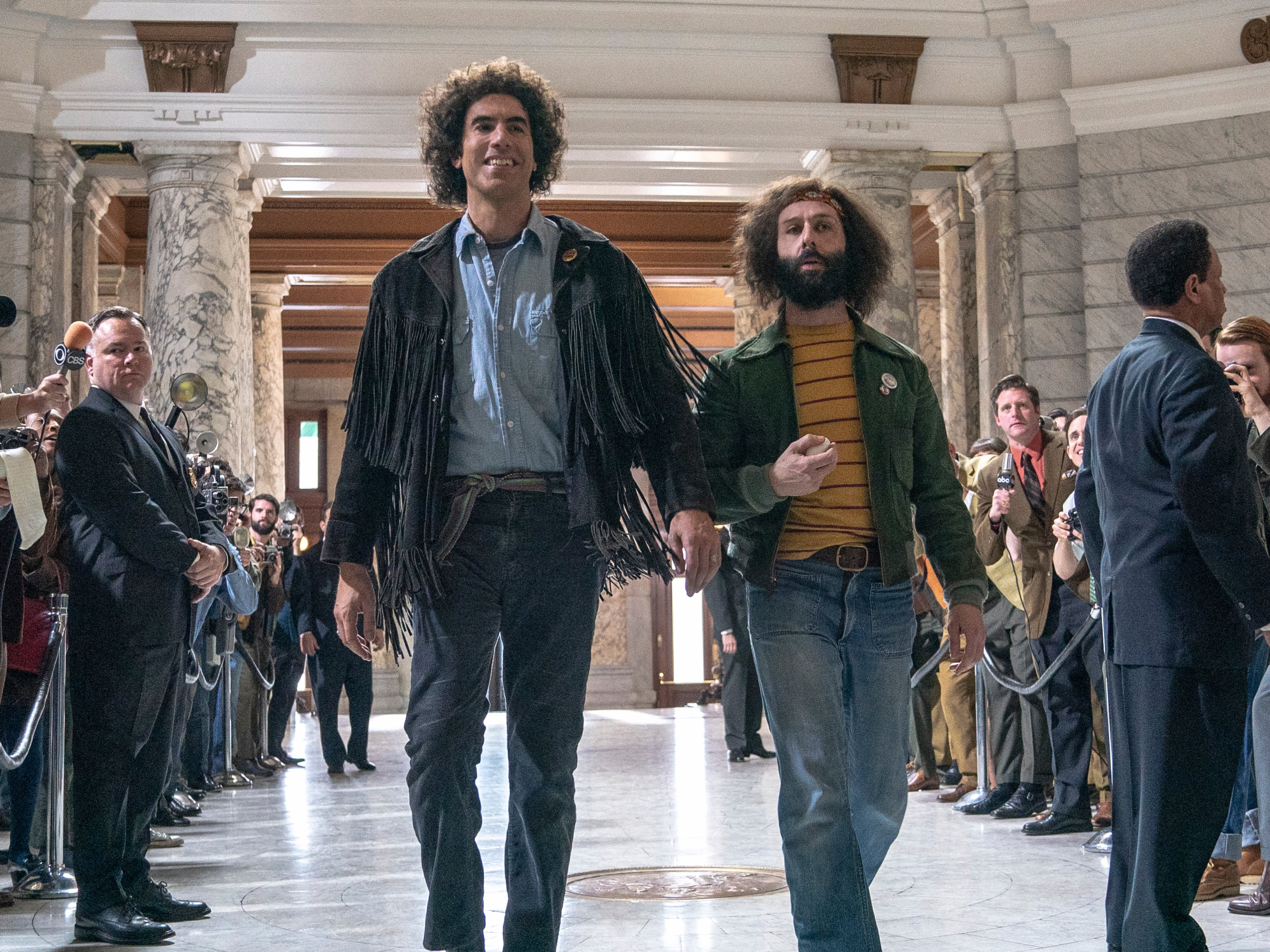
The opening montage of “The Trial of the Chicago 7” is indicative of what the audience can expect of the next two hours — dynamic dialogue, a myriad of characters and an overload of information. While the high-powered conversations are so quick and witty that, at times, they are hard to catch on to, writer and director Aaron Sorkin is clearly onto something; the film perfectly reflects the ever changing, fiery 1960s and the various political players in the spotlight of the notorious 1969 court trial. “The Trial of the Chicago 7” is an excellent dramatization of an already dramatic trial that manages to seamlessly incorporate the stories of radically progressive groups with history about the tumult created by the Vietnam War.
Three groups, the Youth International Party (known at the time as the Yippies), the Students for a Democratic Society (SDS), the Mobilization to End the War in Vietnam (the Mobe) and the Black Panther Party, are all put on the stand against the government of the United States with charges to conspire to cause the riots that had erupted at the 1968 Democratic National Convention. In a mix of reality and fiction, the audience sees the accused eight stand before the seemingly senile Judge Julius Hoffman (Frank Langella) in an effort to defend themselves in a case that they seem to have lost from the start. Intercepting the scenes of the trial are scenes of the “Chicago 7” as they prepare for the protest and attend other demonstrations; these scenes are particularly powerful when the Chicago Police Department is present and offer a jarring reflection of the brutal policing happening even today. Although the cinematography and the setting of the film is exceedingly simple, the storyline and dialogue are not. It is fast paced, dynamic and interesting, as if it is trying to cram in all of the details the audience needs to know about the historical period and its political players before it moves on to another layer of the story — and the film is chock full of layers.
One of those said layers is based on the disgusting treatment of Bobby Seale (Yahya Abdul-Mateen II), one of the leaders of the Black Panther Party, by the judge. Seale, more than the other defendants, was unfairly charged with conspiracy despite the fact that he had not met the other defendants prior to the trial and had only been in Chicago for several hours before flying back to Oakland. Throughout, Seale protests against the assumption that he was in cahoots with the group and is eventually bound and gagged to a chair in the courtroom. Abdul-Mateen II is compelling in his short appearance as the notorious figure who was the co-founder of the Black Panther Party and helps emphasize the pervasive racism that existed during such a “progressive” era. With the assassination of Martin Luther King Jr. just months prior to the trial, Black America was in a state of grief, which Sorkin makes sure to point out. One of the only flaws of the film is that after Seale’s case is finally declared a mistrial, the racism issue essentially disintegrates. It is no longer addressed in the film or by the characters, which makes it feel a bit like the screen time was wasted.
All of the actors, however, make the most of their screen time. Eddie Redmayne, in particular, who plays Thomas Hayden, is one of the charismatic founders of the SDS that manages to win the hearts of the audience along with his best friend, Rennie Davis (Alex Sharp), just as he managed to win the hearts of the jury in real life. He delivers one more heart wrenching speech against the judge at the final moments of the movie that is sure to drive audience members to tears. Beside them, Abbie Hoffman (Sacha Baron Cohen) and Jerry Rubin (Jeremy Strong) offer some much needed comic relief. On the opposing side, the iconic Joseph Gordon-Levitt humanizes the prosecutor, Richard Schultz, with his troubled expressions and soft voice. Although Sorkin has come under fire for the over romanticization of the prosecutorial side, Gordon-Levitt lights up the screen in a way that feels genuine but still manages to allow the flaws of the system and the embedded corruption to bleed through.
Overall, the film keeps its cinematography and soundtrack subdued to allow the dialogue and acting performances to shine, which is definitely the correct decision. By focusing on the historical significance of the moment and its uncommon players, the film results in an entertaining and enjoyable history lesson on the impact the Vietnam War had on a generation.
Verdict: “The Trial of the Chicago 7” is a fast paced film with dynamic dialogue and eccentric characters that managed to encapsulate the turmoil of the 1960s superbly. The acting performances are top-notch, but most importantly, it is one of few films that deftly gives the audience a history lesson on a war that is mostly ignored in the movie industry.







